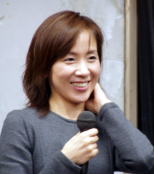No.203-8
UNESCO Cultural
Lecture gCultural exchange, starting from
learning languageh
Date: November 11th
2003 (Fri.) 18:30~20:30 Venue:
Moriya Kyoiku Kaikan
Lecturer:
Ms. Kim Taehee, Actress and Korean language lecturer
Written
by Tadashi Nakamura, Training Program Committee
 Ms. Kim Taehee is from Seoul, South
Korea, and has lived in Japan for 11 years. She has a BA and MA in Art from
Nihon University and is currently on stage and television, as both an actress
and a Korean language lecturer. She has taught on the Korean course of Meguro
UNESCO Association for two years, achieving good results and a reputation for
providing her students with enthusiastic and unique lessons. She came up with
the idea of a study tour to South Korea, planned this and then led a group there (cf. Short News
202-p.3). The following is a summary of her speech for the UNESCO Cultural
Lecture.
Ms. Kim Taehee is from Seoul, South
Korea, and has lived in Japan for 11 years. She has a BA and MA in Art from
Nihon University and is currently on stage and television, as both an actress
and a Korean language lecturer. She has taught on the Korean course of Meguro
UNESCO Association for two years, achieving good results and a reputation for
providing her students with enthusiastic and unique lessons. She came up with
the idea of a study tour to South Korea, planned this and then led a group there (cf. Short News
202-p.3). The following is a summary of her speech for the UNESCO Cultural
Lecture.
gBecause I lacked confidence in my
Japanese, I changed my speciality from the drama course to the movie course at
Nihon University. But after completing that course, I still had a strong wish
to learn drama. So, after passing an audition, I began acting with the Tsuka
Koheifs Drama Group. I soon realised that emotion could be communicated without
necessarily understanding the meaning of the spoken word. When the director
said something in Japanese, I repeated it in Korean on the stage. Although my
stage partner had neither knowledge of Korean nor any idea when my line might
end, he managed to act smoothly. This experience raised my consciousness
regarding language.
gOne of enjoyments gained from learning
foreign languages is finding different expressions for the same concept. The
Japanese word ekomorebif (sunbeams streaming through the leaves of trees), is eheassalf
(sunfs skin) in Korean. And emoolf in Korean is emizuf (water), or eohiyaf
(cold water) in Japanese. If you try to learn a bit of Korean, you will be
pleased to find you understand one or two Korean words when you watch Korean
dramas.
gIt is probably true that keeping an
interest in learning language is difficult, unless the student needs it for
their business. So, I have adopted some games in my lessons to make the lessons
more enjoyable. My interpretation of effecting ecultural exchangef really means
ebecoming friendsf. Many South Koreans are interested in Japanese culture,
whereas Japanese do not seem to know much about South Korean culture. Please
speak to South Korean friends in Korean, even if you only know a few words. You
are bound to make them happy and you will see this in their faces. They will
appreciate you and it will nurture a more favourable impression of Japan. Language
understanding links people emotionally.
gSouth Korean people are said to be
hesitant in smiling, so much so that for the 2002 FIFA World Cup they used a
Smiley mark to encourage people to smile. But it is not true they avoid
smiling; rather, they just get nervous when talking with foreigners. They are
affectionate to their familiar friends, and speaking some Korean words will
make them feel familiar with you.
geWhatfs mine is yoursf (for instance,
food) is an expression suggesting the character of South Korean people.
Japanese people say that courtesy is important even between friends, while
Korean people say that no courtesy is needed between friends. Dependence is
mutually accepted in some sense. The Korean language has a sophisticated system
of using honorific expressions, but using them too much may convey a distant
feeling and be counterproductive. South Korean people often think having
quarrels is a good opportunity to clear the air and strengthen relationships,
so they express themselves frankly and avoid harbouring past disagreements.h
In the
lecture, she introduced many interesting topics on language and South Korean
culture. In answering questions from the audience, she explained how learners
must pay attention to mouth shape, tongue position and throat function, and
this gave us further valuable hints on language learning.
next page
 Ms. Kim Taehee is from Seoul, South
Korea, and has lived in Japan for 11 years. She has a BA and MA in Art from
Nihon University and is currently on stage and television, as both an actress
and a Korean language lecturer. She has taught on the Korean course of Meguro
UNESCO Association for two years, achieving good results and a reputation for
providing her students with enthusiastic and unique lessons. She came up with
the idea of a study tour to South Korea, planned this and then led a group there (cf. Short News
202-p.3). The following is a summary of her speech for the UNESCO Cultural
Lecture.
Ms. Kim Taehee is from Seoul, South
Korea, and has lived in Japan for 11 years. She has a BA and MA in Art from
Nihon University and is currently on stage and television, as both an actress
and a Korean language lecturer. She has taught on the Korean course of Meguro
UNESCO Association for two years, achieving good results and a reputation for
providing her students with enthusiastic and unique lessons. She came up with
the idea of a study tour to South Korea, planned this and then led a group there (cf. Short News
202-p.3). The following is a summary of her speech for the UNESCO Cultural
Lecture.